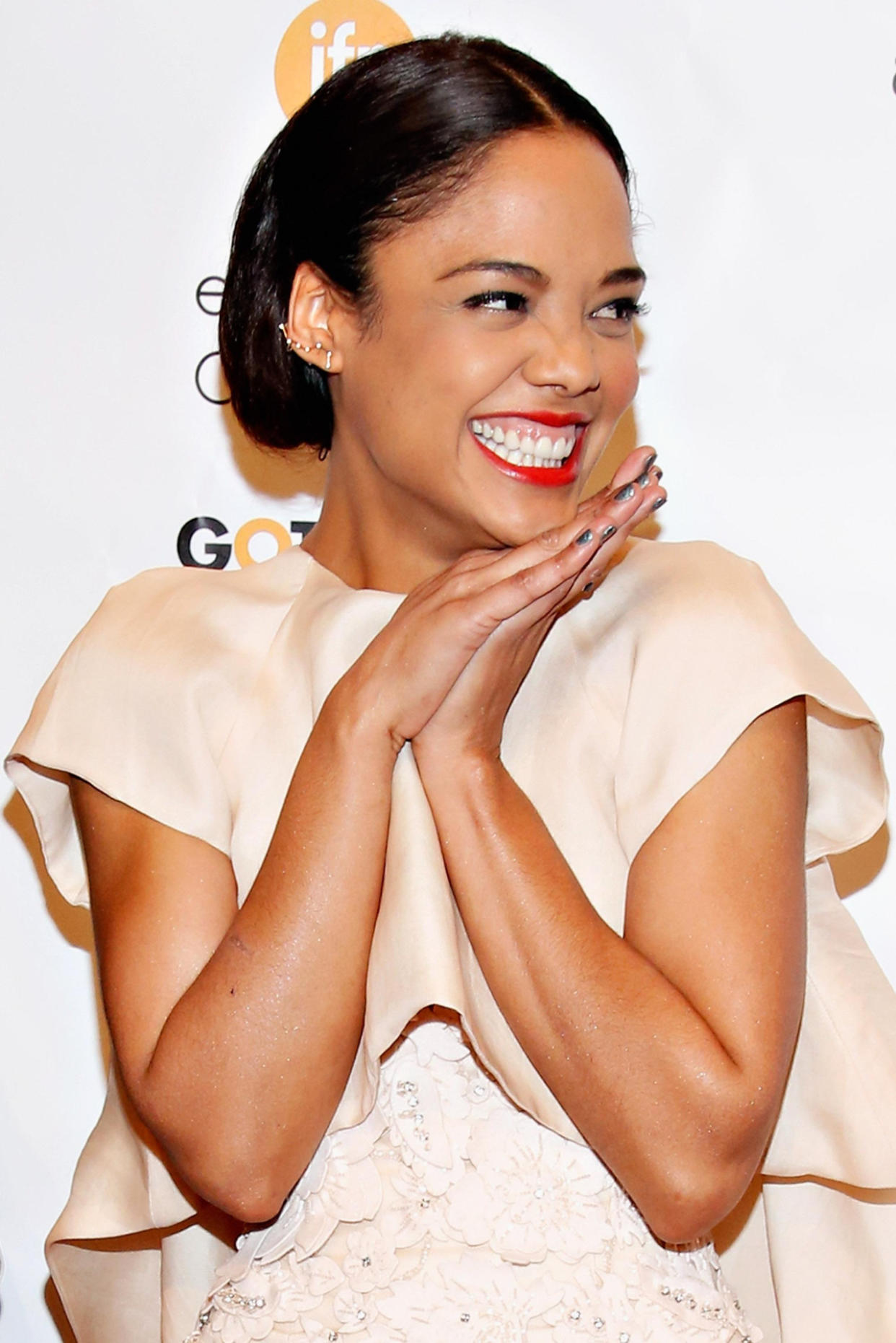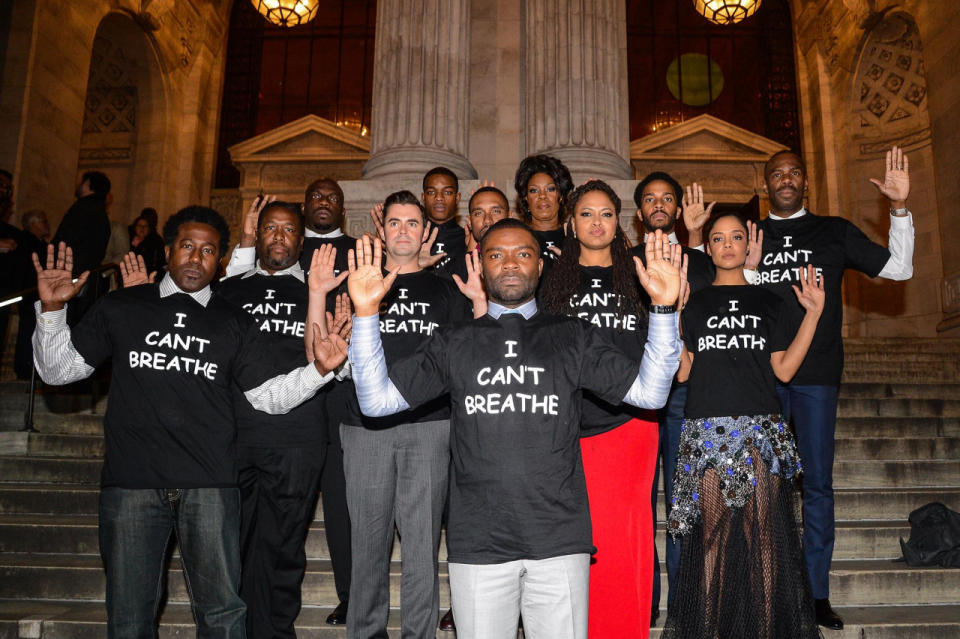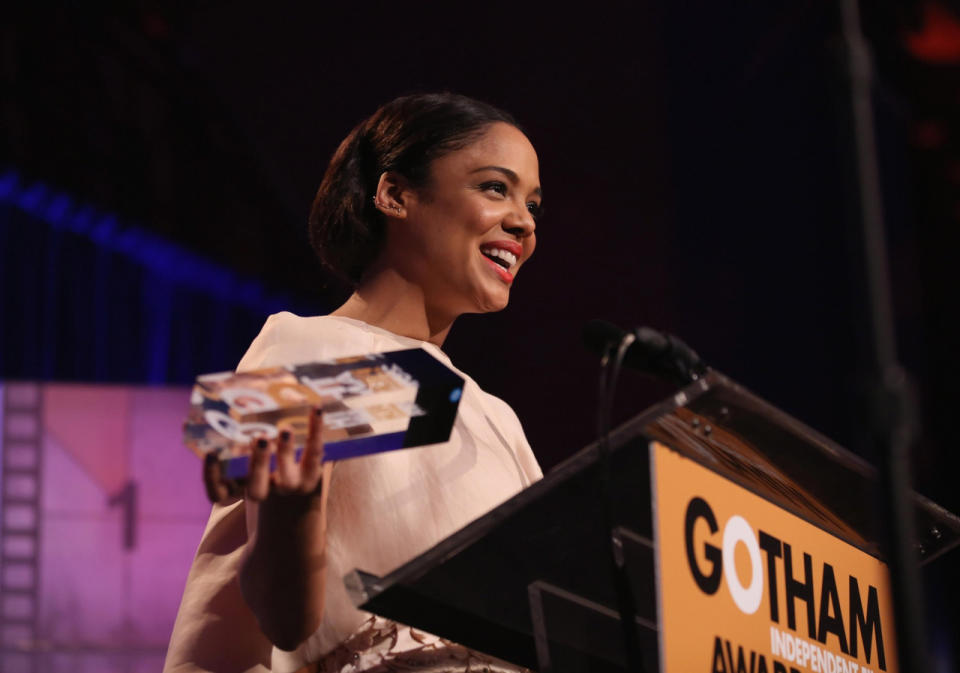Tessa Thompson on 'Selma,' 'Dear White People,' and Her Breakthrough Year

Tessa Thompson rushed into the lobby of the Four Seasons Hotel in Manhattan on a warmish winter afternoon that was filled with anticipation. The 31-year-old actress — who’d arrived with her mother — had just put the finishing touches put on her dress for that night’s red-carpet premiere of Selma, the Martin Luther King, Jr. biopic in which Thompson plays civil rights leader Diane Nash.
The premiere would be the latest big event in a whirlwind 2014 for Thompson, who only a week earlier had won the Gotham Award for Breakthrough Actor on the strength of her complex, powerful and honest lead performance in Justin Simien’s searing campus racial relations satire Dear White People.
But the Selma event also proved to be a symbolic one for Thompson and the Selma team. Just a few miles away from the the event, protesters marched in response to the non-indictments of the police officers involved in the deaths of unarmed black men Eric Garner and Michael Brown. Selma and Dear White People may differ in tone — one a sobering historical drama, the other a whip-smart comedy — but they both tackle racism, American culture, and institutionalized segregation. So the actress felt a bit awkward about walking in front of paparazzi while protesters took to the streets nearby.
Above: Watch Thompson in an exclusive scene from Selma.
In response, Thompson helped organize a red-carpet protest with her cast-mates, in which she and costars (including David Oyelowo, Common, Carmen Ejogo, and Wendell Pierce) wore “I Can’t Breathe” shirts, in solidarity with the marchers. It’s just one of the many socially conscious efforts the actress has undertaken, having also used Twitter and Instagram to participate in causes like Blackout Black Friday, which sought to turn the national post-Thanksgiving shopping holiday into one of reflection and protest.
“We’re in this space — [an] ‘I Instagram and Therefore I Am’ kind of thing that sometimes can be really repulsive,” she said. “When so much is going on, when New York City is filled with people in the streets marching, it seems odd when someone then posts a photograph of their kimchi deviled eggs. It gives me pause about the individual, which is unfair, because it’s ever this way, [and] life goes on.”

Thompson, Oyelowo, DuVernay and’Selma’ castmates in “I Can’t Breathe” shirts
That wrestling with identity and self-presentation, online and off, is at the core of Dear White People. Simien’s Ivy League satire — a hit at Sundance — is a sharp-edged but also heartfelt look at how young people fight to reconcile their interests and instincts with the expectations placed on them by society; it calls out insidious racism and hypocrisy, but also empathizes with young people torn between identities.
Thompson plays Sam, an aspiring filmmaker who uses her college radio show, “Dear White People,” to broadcast funny broadsides and truth-to-power slams on the clueless post-Obama millennials on campus. She gives off a militant vibe and attracts a strong group of followers, but Sam is quietly struggling with her own identity: She’s actually half-white, and is secretly dating a white teacher’s assistant.
The character’s struggle was something to which Thompson could intimately relate, being of mixed-race herself, with a Panamanian father and half-Mexican, half-white mother. Simien tells Yahoo Movies that Thompson, who he first met during a Skype conversation after watching her audition tape, wrote him a letter “explaining how much the character resonated for her personally.”
Growing up, Thompson split her time between Fort Greene, Brooklyn, where her musician father lived, and Los Angeles, where she attended school, taking in a multitude of cultures and influences.
“I was really into Wu-Tang Clan, and [I’m] a product of hip-hop culture —as I think every person of my age is,” she remembers. “So that was a part of me. But I also really liked Joni Mitchell and I liked folk music, depending on who I would talk to. Because, frankly high schoolers can be pricks, [and] in a certain group you couldn’t like Joni Mitchell.”
Thompson attended a large, racially diverse high school in Santa Monica, which she describes as divided along socioeconomic and racial lines; a decade earlier, it had been the site of race riots amongst rival gangs. To address the inherent tension that remained, Thompson helped a friend start a student group called Racial Harmony, which sought to create an actual conversation on campus.
“The idea was that you got 100 students together, 20 from each of the five basic racial groups, and you have them sit in a group together,” Thompson explains. “We’d sit in a room and you would, privately with just your group, write down the stereotypes that you had either heard, or that you believe about the other races. And then you’d see the other peoples’ lists and you would have these really candid, frank dialogues.”
Her first year, Thompson sat in with the African-American students’ discussion group; as a sophomore, she joined with the Latino participants. That was “already a little bit uncomfortable,” she remembers, but nothing compared to what happened in her junior year.
“The third year, I wanted to be in the white group, which was just me being in high school,” she said, laughing. “And that wasn’t allowed, because they thought — and rightfully so — that no one in that group would want to say all the things that they might be inclined to say, because I’m there.”
Thompson stored these experiences deep inside and use them to inform her Dear White People performance, but it was not a straight line to get to the set of that film. By her senior year, Thompson became enthralled with the message of her beat-literature teacher, and when he introduced her to Mark Twain’s famous quote about not letting schooling interfere with her education, she took it literally.
After graduation, she took a year off to travel, shuttling up to the Bay Area to walk in the shadows of and read in the same bookstores as Kerouac, Ginsberg, Ferlinghetti and the other speed-aided minds of the 50s. Then it was off to work canvassing for an NGO called Humana, which inspired an ambition to join the Peace Corps…. which, unfortunately for the budding humanitarian, required a college education (Twain’s advice, it would turn out, is less practical in an age of competitive résumé-building and careerism).
So Thompson enrolled in community college, shortly before a sudden newfound love of Shakespeare sent her off exploring the Los Angeles theater scene. Soon enough, she was performing in local stage productions, auditioning for commercials and TV work, and supplementing her artistic ambitions with work as a bar mitzvah dancer, an on-and-off gig that she began as a 15-year-old after lying about her age during an audition.
Seeing a producer she had auditioned for at a bar mitzvah made her realize that it was time to quit the gig, and pulling back that safety net kicked her pursuit of acting into overdrive. Soon after dancing her last Horah, Thompson landed her first TV role, as Wilhemina ‘Billie’ Doucette, a bootlegging lesbian from the 1930s in a 2005 episode of Cold Case.
“The whole episode was basically trying to figure out that these women were so in love but couldn’t be together obviously, because of the time: They were interracial, not just lesbian, and so they were super star-crossed,” she recalls of the role, which began a career of taboo-pushing within the mainstream. “They end up doing a suicide thing together, like driving off a bridge so they can be together forever.”
The CBS procedural dressed her up in heavy flannel suits and a fedora, and required her to learn to smoke packs of Nat Shermans and recite reams of poetry in romantic flashback scenes that were half-narrated by the show’s regular cop cast. She loved every minute of the experience.
“I was like, this is what I want to do forever and ever,” she says, smiling. “It was the dreamiest first job.”
The gigs kept on coming, too, including a regular role in the second season of the cult hit teen noir WB show Veronica Mars, as a high schooler named Jackie Cook. Mars became a springboard for a solid next eight years of TV work, including guest spots on Grey’s Anatomy, Heroes, and Private Practice, along with roles in such films as For Colored Girls and Make It Happen.
But it took Dear White People for Hollywood to really take notice. The film won Simien a Special Jury Prize at Sundance, ultimately earning a 91 percent positive rating on Rotten Tomatoes, as well as plenty of fawning tweets from celebrities that Thompson can excitedly recite back. To wit: Helen Hunt’s tweet of approval had the cast giving the film the unofficial tagline, “Helen Hunt is Mad about Dear White People!”
More importantly, Simien says that he’s received “a real sense from a group of people who look like the characters in my film that the movie articulated something that had been on the tip of their tongue.”

Thompson accepts the Gotham Award for Breakthrough Actor
And Thompson now has enough bona fides to land a major franchise role: Last week, it was announced that she would join Fruitvale Station director Ryan Coogler and Michael B. Jordan in the new-age Rocky spinoff Creed, in which she will play the female lead. Jordan plays Adonis, the grandson of original Rocky mainstay Apollo Creed, and Thompson is his next-door neighbor, an aspiring electronic R&B singer named Bianca who works out of her home studio.
Jordan, she says, has been in training for months for the role, boxing first in Los Angeles and now in Philadelphia, where he is working with professional boxers who have a role in the movie. He’s looking extremely buff these days, based on videos they send Thompson from the set, thanks to “his crazy diet and boxing day and night.”
But he’s not the only one preparing intently for the film. Having spent two years working with her R&B group, Caught a Ghost, Thompson is now writing music for the film, as well, working to find the right sound for her up-and-coming star character.
“I think it’s pretty clear that I’m our version’s sort of Adrian, though I don’t work at a pet store” Thompson says of her Rocky role. ”I do have a fish, though, which is just a little shout-out… but Ryan is intent that the thing that sort of [these characters] together is that they’re both young people that are aspiring and are in industries that are kind of challenging and have a lot of hard knocks — bad pun intended — and find solace and strength in each other. Sometimes, the love interest in a sports movie only serves to move the male character forward, or be the sort of person you can cut to or have a hard time when the person is not winning. In this movie, they’re both in danger of not winning.”
As she showed in Dear White People, Thompson is ready to fight for those sorts of roles, too, because after nearly a decade of climbing the Hollywood ladder, she finally feels in control of her destiny.
“When I first started working, I was just working and seeing what happened,” she said. “And now I feel like I have a lot more clarity about the kind of work that I want to do. I feel way more integrated. It’s really easy to sometimes feel like a cog in something moving, especially as an actor, you’re a very small part of what becomes a big picture. Now, I feel more integrated.”
